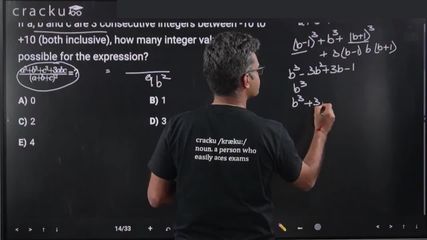If a, b and c are 3 consecutive integers between -10 to +10 (both inclusive), how many integer values are possible for the expression?
$$\frac{a^3+b^3+c^3+3abc}{(a+b+c)^2}$$=?
Solution
Since a,b,c are consecutive integers
=> $$a = b-1$$ and $$c = b+1$$
Expression : $$\frac{a^3+b^3+c^3+3abc}{(a+b+c)^2}$$
= $$\frac{(b - 1)^3 + b^3 + (b + 1)^3 + 3 (b - 1) b (b + 1)}{(b - 1 + b + b + 1)^2}$$
= $$\frac{b^3 + 3b + b^3 + b^3 + 3b + 3b^3 - 3b}{9 b^2}$$
= $$\frac{6 b^3 + 3 b}{9 b^2} = \frac{2 b^2 + 1}{3 b}$$
Putting different values of b from - 10 to 10, we can verify that only - 1 and 1 satisfies to get integer values for the expression.
Ans - (C)
Video Solution

Click on the Email ☝️ to Watch the Video Solution
Create a FREE account and get:
- All Quant Formulas and shortcuts PDF
- 15 XAT previous papers with solutions PDF
- XAT Trial Classes for FREE
